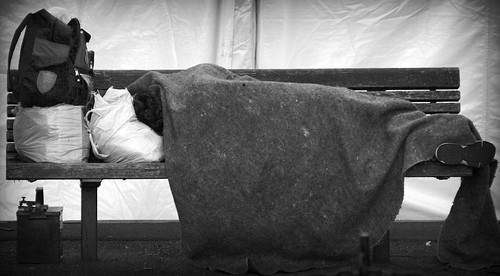
When you hear the word "poverty," what do you think about?
Me? The images conjured up in my head are usually of dusty countries, where children with fly-encrusted eyes sport weirdly bulging bellies and women haul water in jugs from dingy wells miles away from their ramshackle huts.
And hey, we wouldn't be wrong. It's incredibly important to recognize and try to do something about that kind of extreme, abject poverty that exists for far too many people in this world.
But in honor of today's Blog Day of Action focusing on poverty, and since my blog is but a small, local blog, I want to focus on the kind of poverty that all-too-often goes overlooked: the kind that exists in our own backyards, right here in Wisconsin.
Statically, Wisconsin ranks 33rd highest in the nation when it comes to poverty, with a rate of 10.9% (including 14% of children). In human terms, that means that somewhere around 600,000 people in this state live in poverty, and the trend, unfortunately, seems to be toward things getting worse.
We're all feeling the increasing pinch of the credit crunch and general economic downturn. Those of us who were already living on the very edge, however, are being pushed into the abyss by this downturn in fortunes. Second Harvest, an excellent food pantry that serves 16 counties in southern Wisconsin, reports an significant increase in the number of individuals and families served by its programs over the last few years. This coupled with the unfortunate decrease in the amount of food being donated from corporations are both troubling signs of the times.
While poverty has been a pressing issue for a long, long time, things certainly seem to be getting worse for a wider range of people these days. Now more than ever, perhaps, it is important to take a hard look at our policies and programs, to see what we can and should be doing better to ensure that fewer (or preferably, none at all) people end up falling below the poverty line, and to help raise up those folks who are already there.
It will take a carefully considered balance between government and community programs to do this, but it's possible.
While we take time to consider the many and varied root causes of poverty--things like educational quality and opportunities, job availability and wages, culture, etc.--we must also be sure to tend to the immediate needs of those most at risk.
Organizations like Second Harvest and the Wisconsin Community Action Program Association (WISCAP) are crucial, and I urge you to either donate food, time, or other resources to help bolster their efforts. WISCAP especially provides a good example of the kind of work that helps lift people out of poverty by working toward job training and creation, fostering small businesses, providing educational opportunities for young and old, developing and maintaining affordable housing, and even helping to weatherize homes in order to make them more energy efficient (and therefore lower cost).
Poverty, whether directly or indirectly, effects us all - and it benefits us all to do what we can to lessen and/or eradicate it. In a country as wealthy as ours, there is no excuse for us to allow such large swaths of our community to live without basic resources. No one should have to choose between food and heating bills, or medicine and rent. It will take a mixture of personal responsibility, community action, and government assistance to make things better. The payoffs will be many: a more productive and educated workforce, lower health care costs, potentially lower crime rates, healthier people and families, etc.
We simply cannot afford to ignore the problems that exist all around us. Clearly there are deep divisions over and misunderstandings about poverty even in seemingly well-off and liberal Madison, where debates over homelessness have recently turned heated. But it's important to take a hard, honest look at ourselves and our communities, and to make good-faith efforts at real improvements. We can't just sweep the problems under the proverbial rug, hoping that they'll just move to other cities or stay quiet enough that we can just walk by without looking.
Today, the Capital Times has two articles dealing with homeless students in our state's public schools, and how, with limited funding, they're trying to address their needs as best they can.
For an excellent, more in-depth look at poverty in Wisconsin, read this report from WISCAP (pdf).
If you want to help, consider a donation to Second Harvest, supporting programs like Porchlight, or helping out with something like the Luke House Community Meals Program. Every little bit helps.







1 comment:
enjoy my music, support my living (yup, I am on the street)
music on "Antimodernism" (scanned sheet music, my compositions)
Post a Comment